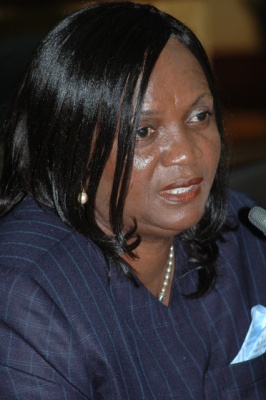Is a Kangaroo Court in the Making?
The 1992 Constitution of Ghana provides the following with respect to the CHRAJ mandate: “……Chapter 018 - 218 The functions of the Commission shall…include the duty, (a) to investigate complaints of violations of fundamental rights and freedoms, injustice, corruption, abuse of power and unfair treatment of any person by a public officer in the exercise of his official duties;…..(e) to investigate all instances of alleged or suspected corruption and the misappropriation of public moneys by officials and to take appropriate steps, including reports to the Attorney-General and the Auditor-General, resulting from such investigations;…. Chapter 024 - 287(1) An allegation that a public officer has contravened or has not complied with a provision of this Chapter shall be made to the Commissioner for Human Rights and Administrative Justice and, in the case of the Commissioner of Human Rights and Administrative Justice, to the Chief Justice who shall, unless the person concerned makes a written admission of the contravention or non-compliance, cause the matter to be investigated….”
The recent Supreme Court sub-panel 4-1 decision that the CHRAJ must have a “formal” complainant before CHRAJ can investigate reports of corruption and official improprieties took many people by surprise. In a language as odd as I have ever read, and using verbal gymnastics that creates and adds to the Constitution, the sub-panel in effect said that complaints sent to the mass media about corruption and official malfeasance can never be actionable by CHRAJ under any condition – CHRAJ has no mandate to “investigate” issues published in the media without “a formal complainant.” The last I checked, about 75% of Ghanaweb contributors who cared to make a comment on that GNA report expressed shock and disappointment at the ruling (Ghanaweb, 21 Dec 07). Prof Lungu was one of the 75% of the respondents and I will argue in this piece that the 4-1 ruling goes against reason, administrative process, justice, and the Constitution of Ghana.
Prof Lungu agrees totally with Dr. Justice Date-Baah, the lone dissenter to that decision on the 5-person panel, and with Awudu (See Awudu comment sub-titled, “Bad Reasoning.” The reader is urged to carefully consider the fictional scenario (Case Study) below, and to ask themselves whether it would be reasonable for CHRAJ to begin an investigation where the “complainant,” (Mrs Afia Halifu Doe Akwokwo), did not go directly to CHRAJ, but sent “actionable” and thus “important” information to CHRAJ, through the media. If the GNA report is accurate, the “new” Justice Wood standard says that “a formal complaint have to be lodged with the commission (CHRAJ) before it (CHRAJ) could investigate issues published in the media or made at public fora.” Here is the Case Study for your consideration at this time:
CHRAJ CASE STUDY (01-Wood-2008):
DEAR READER - Our newspaper received some documents from a Mrs Afia Halifu Doe Akwokwo last week asking for help. We are a very small newspaper and we do not think that we have the means to adequately investigate this matter, one way or the other. We are publishing the letter received, unedited, and are asking responsible officials to take a good hard look:
LETTER TO EDITOR:
//////////////////////////////////////////////////////////////
1 Jan 2008
Dear Editor & CHRAJ Commissioner,
My name is Mrs Afia Halifu Doe Akwokwo. From Jan 2003 through Dec 2007, I was the Purchasing Executive in the Ghana Ministry of Education. I worked under Mr. Abu Atiemo Danquah Titi all those 4 years. I have evidence of corruption, abuse of power, bribery, and sexual harassment against my former boss. Currently in my possession are falsified purchasing receipts and contracts, photographs, email messages, and copies of official memos that were ordered destroyed by my former boss one week before I vacated my position as Purchasing Executive. These documents are in my possession and copies have been given to my Attorney, Ms. Aba Agymah Salifu Koranteng, of the AASK Law Chambers, Tema/Sunyani/Chirapatre/Agona/Paga/Tamale/Nkawkaw/Kumasi/Zukpe.
For instance, Mr. Titi says that he personally incurred a cost of $5000 on 15 Nov 2007 in Berekum while on official business. That $5000 bill was charged to the Government of Ghana by Mr. Titi, via Invoice Number GOVG 12MOED2007Nov15. I know personally, and have Airline/Hotel receipts that prove that Mr. Titi was actually in Denmark on private vacation all of Nov 2007.
Please contact my attorney or the editor in the interest of Ghana. I am available to assist with any investigations and my Attorney has assured me that what I am reporting is in the spirit of the good fight against corruption in Ghana, further, that it is also in the spirit of the Ghana Whistle-Blower law.
Sincerely, (signed)Mrs Afia Halifu Doe Akwokwo
///////////////////////////////////////////////////////////////
WHICH WAY, CHIEF JUSTICE WOOD?
A funny thing happened on the way to “interpretation” and application of the CHRAJ mandate by Justice Wood and the 3 Justices who supported the ruling against CHRAJ! (Why it took so long for the Justice Wood to decide this simple case, is another matter entirely). But the relevant section of the 1992 Constitution provides the following, “to investigate complaints of violations of fundamental rights and freedoms, injustice, corruption, abuse of power and unfair treatment of any person by a public officer in the exercise of his official duties…to investigate all instances of alleged or suspected corruption…”
As the reader can see, the phrase “’formal’ complaint” is not available in that mandate at all. Not in Chapter 024 or Chapter 018. It is fair to say that it was invented by the Wood sub-panel. Seems to me this is a very creative interpretation of the Constitution by Justice Wood and Justice Stephen A. Brobbey. From one side of their mouths they are telling us “if formal complaint (are) not made to the commission (CHRAJ) people could subject the process to abuse and make wild allegations against public official based on mere suspicion and speculations." From the other side of their mouths they are telling us that they themselves can speculate with respect to the future intent, professional competency, and sense of fairness and purpose of the CHRAJ Commissioner. How come?
WHAT CHIEF JUSTICE WOOD IS TELLING THE PEOPLE:
We are arguing that the “Wood invention” goes against the spirit and purpose of the Constitutional provisions. The ruling against CHRAJ is very troubling, to say the least. Whence this interjection of “formal” by Justice Wood and Justice Stephen A. Brobbey? We say that it is an “invention,” truly a figment of their wild imagination. It is sedentary, and it is impractical for Ghana.
By this decision, Justice Wood and Justice Brobbey are saying that the Commissioners at CHRAJ, a quasi-judicial agency, are unqualified and unreasonable people and that CHRAJ has/will misuse administrative discretion. Justice Wood is telling us there is no recourse to abuse of power by CHRAJ during/after a CHRAJ investigation, one way or the others. Further, Justice Wood is telling use that the fight against corruption in Ghana is less important than the means by which complaints get to CHRAJ. Chief Justice Wood and Justice Brobbey are telling us that the “reputation” of Government officials, who are public figures and have accepted the principles of transparency and accountability, is more important than reigning in corruption and perception of official malfeasance within the Government of Ghana. Above all, the 4 Justices are telling us that they are wiser and have a more important function than the people, and the mass media combined.
We beg to strongly disagree on all those counts!! It is a simple case of confusion in the minds of the 4 Justices about the mode of delivery of a complaint, the purpose, and the intent of the CHRAJ law as directed by the Constitution. As we have argued, there has been an invention of the word “formal” and there is nothing plain about that at all. Further, that ruling goes against the purpose of the fight against corruption and is even at variance with the Whistle Blower law aimed at finding and prosecuting white collar criminals.
SO WHAT NEXT, CHRAJ?
Prof Lungu sent email to CHRAJ’s Commissioners requesting an electronic copy of the official decision. We have not heard from CHRAJ. Still, it is a matter of importance to Ghana what CHRAJ does next. At the minimum, CHRAJ can do nothing, or they can act and quickly incorporate this ruling into their Standard Operating Procedures. In this case, it could simply be a warning to the people to not use the media, ever, if they want CHRAJ’s attention. That, the reader will agree, is foolish in deed. But it is the practical consequence of the Chief Justice Wood ruling. CHRAJ can also appeal this ruling to the full Supreme Court as was done in the Tsatsu Tsikata v. Attorney General (Fast Track Court Case). And then again, CHRAJ can do all these things except the first one of “do nothing.”
WHAT NEXT, CHIEF JUSTICE WOOD?
We think that this CHRAJ decision is unnecessarily creative even though the public health, safety, and morale are absolutely not in danger, or impaired. Those are the circumstances under which it is prudent for Justices to be a tad creative. What Chief Justice Wood and Justice Brobbey have done is to create a false choice between the good public health fight (anti-corruption) and a personal privacy issue that does not exist. Public officials are public figures whose names are always in the media. Public officials are not powerless. They have the means of the government to quickly address any and all reports of improprieties on their part, including using their offices and the offices of the Ghana Ministry of Information to answer all questions that might affect their character, competence, and their performance.
Sadly, this ruling goes to buttress the point we made the last time that “Chief Justice Wood is living in a bubble,” (Prof Lungu, Ghanaweb, 10 Oct 07). We made this point when Chief Justice said that the “Legal Profession is not Market Driven Business.” One question for Chief Justice Wood on that score is why she thinks that lawyers even in practice ought not to focus on bottom-line economics and “self pursuit,” including those defending corrupt public officials found friends by a duly constituted Ghanaian quasi-public agency to have siphoned large amounts of public funds to their dependents. Further, why must Ghanaians quarrel with the “delivery vehicle” when there is absolutely no showing that CHRAJ misused its powers capriciously and failed to provide opportunity for the person to defend himself/herself?
The bottom-line is Chief Justice Wood and Justice Brobbey, by this ruling, are actually constructing Rat Holes for corrupt public officials and politicians to continue the shopping spree they have been having with the peoples’ financial accounts, and misuse of the full faith and credit of Ghana. This ruling is a part of the pattern that says that corruption is perception and that it is up to the ordinary citizen to file complaints and prosecute public officials for corruption and other official vices. Sadly, this ruling dovetails very well with efforts by Attorney General Joe Ghartey to emasculate the Ghana Whistleblower Act even before it gets off the ground. Recall that Mr. Ghartey and a few people in government want to amend the Whistleblower law by prescribing punishment in the law for people whose only “crime” is providing “misleading information” to government agencies fighting white collar crime. I do not know about you reader, but Prof Lungu smells a Kangaroo Court in the making!!
QUESTION FOR JUDICIAL MINDS:
Chapter 024 - 287(1) says that an allegation against CHRAJ shall be made to the Chief Justice “who shall, unless the person concerned makes a written admission of the contravention or non-compliance, cause the matter to be investigated.” In this case, who is it that “investigated” the case against CHRAJ, and when and how did Chief Justice Wood “cause the matter to be “investigated”?
















